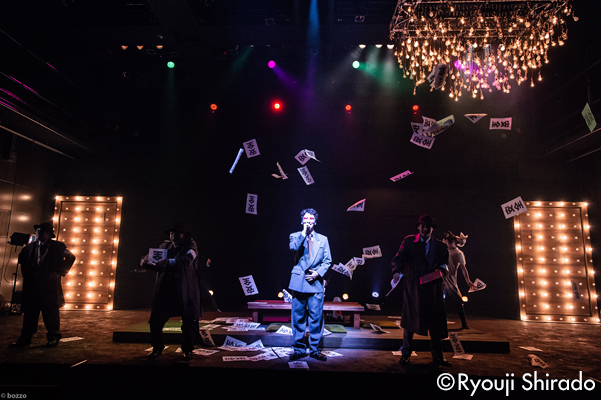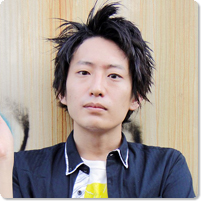
DULL-COLORED POP 20th stages Play II of the Fukushima Trilogy
1986: Moebius strip
(Aug 8 – 11 at Tokyo Metropolitan Theatre – Theatre East)
Photo: Ryouji Shirado
Data
:
Premiere: 2019
Play II of the Fukushima Trilogy 1986: Moebius strip

Playwright, director and translator. Born in Fukushima Prefecture in 1982 and raised in Kashiwa City, Chiba Pref. Tani is the leader of the theater unit DULL-COLORED POP. Tani majored in Theater arts at Meiji University and took courses in Theatre and Drama Study at University of Kent at Canterbury in the UK before starting his own theater company in Japan. His theater style has been described as “a fortunate mix of innovative methods and a knowledge of classical theater” (Ai Nagai) and his creative style as a playwright and director has been widely praised as pop and rock and literary and wins praise in fields ranging from small-theater productions to commercial theater.
In 2013, his Japanese translation and staging of Freud’s last Session with the Japanese title Saigo no Seishin Bunseki – Freud vs Lewis (The Last Psychoanalysis: Freud vs. Lewis) won him the 6th Yushi Odajima Drama in Translation Award and the Agency for Cultural Affairs’ Arts Festival’s Excellence Award.
In recent years he has also collaborated on numerous works with renowned foreign directors, serving as translator, script writer and directing assistant on their productions. They include Silviu Purcarete’s production of Richard III, Philippe Decouflé’s production of “Watashi ha Shingo, Sidi Larbi Cherkaoui’s production of PLUTO, David Leveaux’s production of Eternal Chikamatsu and others. Representative works in recent years include the KAAT production of The Threepenny Opera (translation, stage script, direction), the Tokyo Metropolitan Theatre production of Every brilliant thing (translation direction), DULL-COLORED POP production of the Fukushima Trilogy and many others. The Fukushima Trilogy (1961: Midnight Sunrise, 1986: Moebius strip, 2011: The Words Want to be Spoken) is the winner of the 64th Kishida Drama Award. The second play, 1986: Moebius strip is the winner of the 23rd Tsuruya Namboku Memorial Award.
DULL-COLORED POP
https://www.dcpop.org/

DULL-COLORED POP 20th stages Play II of the Fukushima Trilogy
1986: Moebius strip
(Aug 8 – 11 at Tokyo Metropolitan Theatre – Theatre East)
Photo: Ryouji Shirado
Data
:
Premiere: 2019
The setting is 1985 and ’86 in the town of Futaba-cho in Fukushima prefecture, 15 years after the nuclear power plant was constructed and went into use. The Hozumi family’s form pet dog Momo appears as a ghost and begins to reminisce about how the town has gotten wealthier thanks to the grant money that came in for accommodating the nuclear power plant.
The Hozumi family’s second son, Tadashi, who was 19 at the time when he yelled in protest at Futaba-cho’s mayor and the employees from Tokyo Electric Power Company, who were visiting towns in the area in search of one that would accept the nuclear power plant, is already 44 years old now. As a leader of the anti-nuclear power plant activists, Tadashi had once been elected to the Prefectural Assembly, but after the power plant began operation he had failed each time to be elected again. Because he had gone off to participate in the “Make Futaba-cho a Bright Town Citizens Meeting,” he couldn’t be at his dog Momo’s side when it died.
That night, Tadashi’s daughter Satoko’s fiancé, Tokuda, who is a Tokyo Electric Power Company employee, the Fukushima Prefectural Assembly member Marutomi, who is also Tadashi’s mentor, and Yoshioka, the young secretary of a Fukushima Prefectural Assembly member named Hirashima come to visit Tadashi.
Marutomi and Yoshioka tell Tadashi that they were inspired by his speech at the Town Citizens Meeting. They encourage Tadashi to run for mayor in the next election that will take place when the current mayor of more than 20 years resigns due the news of his guilt in some cases of corruption.
The realist Yoshioka argues that in order to win the mayoral election they don’t need a candidate who still supports the dream of getting rid of the nuclear power plant but a leader who can point the way toward tackling the problems that make the nuclear power plant dangerous and paving the way toward positive coexistence with the nuclear power plant. And he goes on to say that the only person who can do that is someone like Tadashi who knows better than anyone the fearsome dangers of nuclear power plants. Hear that, Tadashi begins to think about the possibility that it is indeed his mission to protect their town and help industry flourish at the same time.
Tadashi announces to his wife Miya and his son Hisashi that he intends to run for mayor. The two have always disliked his political activism and they oppose the idea. Tadashi persuades them by saying that run on a platform of accepting the nuclear power plant and dedicate his efforts to helping the town develop in positive directions.
Momo takes the stage again and talks about the fact that many of the town’s citizens work at the power plant, the fact that a large-scale nuclear disaster takes place in Chernobyl on April 26, 1986 and the treat presented by the worldwide spread of radiation and more.
The scene shifts to the Futaba-cho mayor’s office. The new mayor, Tadashi, is working with Marutomi, Yoshioka and Tokuda to prepare for a press conference about the Chernobyl disaster. After hearing a report from Tokuda about the massive scale of the disaster, Tadashi proposes that in order to prepare for the worst possibility, they should shut down the Fukushima nuclear power plant temporarily for a thorough emergency inspection.
Yoshioka opposes the idea, arguing that an admission that they had allowed the plant to continue running despite knowing the possibility of an accident would be the equivalent of admitting to a sin on their part as politicians. He presses Tadashi by asking if he is really prepared to shut down the nuclear power plant that is the lifeblood of the town’s economy. Even though he has realized that the nuclear power plant is not contributing to the industrial development of the town, Tadashi eventually gives in and accepts Yoshioka’s argument.
At the press conference, Tadashi repeatedly insists that Japan’s nuclear power plants are safe. The atmosphere in the conference gradually becomes one where everyone feels that the proceedings are nothing more than nonsense.
When the disheartened Tadashi returns home, he talks to his son Hisashi about the time when talk of accepting the building of the nuclear power plant first arose in their town. He admits that as a young man he first objected strongly to his late father Masashi’s decision to entrust the town’s future to a nuclear power plant, but it is also important to respect the difficult decision he made.
Momo appears on stage again and says that if you talk about respect for the dead, the living today should lend an ear to father Masashi and the other deceased members of the Hozumi family who continue to look down on them as souls in the other world.
After watching the TV broadcast of the press conference, Hisashi expresses his anger at seeing Tadashi switch to insisting on the safety of the nuclear power plants as soon as he became mayor despite having worked so long and hard as an anti-nuclear power plant activist.
Momo appears again to say that there are cases where “one” (Heidegger’s Das Man) must bend their own sense of what is right in consideration of others or other things in order go on living. That is the reality of the commoner.
In the face of his son’s criticism, Tadashi is about to voice his long-held belief that nuclear power plants are not absolutely safe. But just at that moment Tokuda arrives to happily announce that his wife (and Tadashi’s daughter) Satoko is pregnant. Knowing that he will soon be a grandfather, Tadashi returns to the Das Man and joins with Tokuda raise their voices in unison, saying “Japan’s nuclear power plants are safe!”
Momo approaches Tadashi after he has just refrained from speaking his true mind and says, “Don’t the living hear the voices of the dead?”
Related Tags